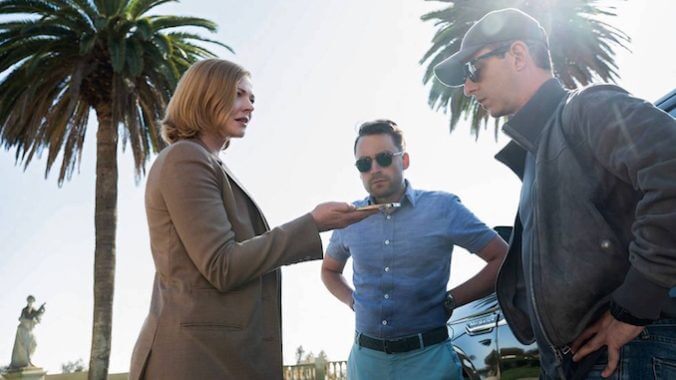Succession Remains a Claustrophobic Masterpiece in Its Fourth and Final Season

The word “claustrophobia” is, at heart, fairly horrific and viscerally unappealing, and I wanted so much for my brain to travel in a different thematic direction when considering how to write about the final season of Succession. If someone describes something as “claustrophobic” to me, my gut reaction is, “excellent, I won’t watch it.” And if you haven’t watched Succession, well, in the words of my southern brethren, bless your heart.
There are a thousand ways to praise what has been a unique, superlative show since its first episode, and if you’re interested in a good/bad evaluation, I can assure you that through the four episodes of the fourth season provided to critics, it seems better than ever in that particular way of shows whose excellence never wavers; a steadiness that creates in the mind a sense of ascent, so that each part exceeds the previous in perception while the true shape is more of an unending plateau. Yes, the shit is red-hot, the comedy just as cutting and hysterical as ever, the drama just as compelling, and if that’s what you were waiting for, go forth in good faith.
In a note to critics that came with the screeners, the show’s creator Jesse Armstrong asked us in very nice words not to spoil any plot points, and this too drove me inexorably back into the arms of claustrophobia. As a classic middle class American boy, I didn’t encounter real wealth until college, and in the very brief time I spent socializing in those circles, I always felt a sense of restriction. It had nothing to do with the people, who were fine, but with the world and what it demanded and the pressures it created, and Succession captures this with an uncanny depth of vision. The Roys and their ilk live in lush, beautiful worlds, but there is always a sense that they’re captive to the money that creates this beauty, and the captivity works on them in strange ways. Logan Roy is forever seeking a war, something to boil the blood and shake him into action, while a weaker figure like Kendall succumbs to the escape of drugs, Shiv fucks around and occasionally also cheats on the family company, Connor pretends he’s independent and indulges in power fantasies, and Roman takes shelter in withering irony and fetish. They all want out, not just from ATN, but from each other, and from the captivity of their enormous wealth. And they all understand, deep down, that not only can’t they escape, but if they did, they’d flounder. Like any good addiction, it has hooked them to the point of need.
This claustrophobia works just as well on the family level. In a previous season, we saw Kendall on the verge of a real breakaway when a bad decision at a party resulted in catastrophe and put him back in his father’s debt. Strangely, the prevailing sense among the involved parties was one of relief. Independence from family, from business, is one part allure and three parts terror. And as Logan Roy understands in his gut, from how he’s manipulated the American people, when it comes to motivation, terror will beat hope every time.
Thus, they also can’t escape from each other, and this is a dynamic that any big family in the world, regardless of wealth, can understand. The ties that bind are unbearably strong, even when those ties are fundamentally toxic. There is natural ebb and flow, of course—two people are on the outs, then back together, then out again—and that provides the illusion of movement. But finally, there is no breaking free. Shiv, Roman, and Kendall have beautiful moments of real tenderness, but even in the opposite moments—as in the nightclub at Kendall’s gauche birthday party in Season 3, when Roman lets loose with the kind of soul-cutting invective that would sever even the tightest bonds, they’re not in real danger of falling outside each other’s sphere of influence.
So it goes also with loyalty and betrayal. They form the backbone of the drama, and third season’s finale was a particularly brutal gut-punch, but it’s all on a continuum; the Roy siblings have been infected with the push-and-pull rhythms of their father, and each time they come together, it’s only a prelude to screwing each other over, and each time they screw each other over, it’s only to tighten again. On the surface, they are selfish, unsympathetic human beings; deep down, as creatures who have been molded by caprice and limited by cruelty, who could be more sympathetic?
-

-

-

-

-

-

-

-

-

-

-

-

-

-

-

-

-

-

-

-

-

-

-

-

-

-

-

-

-

-

-

-

-

-

-

-

-

-

-

-








































